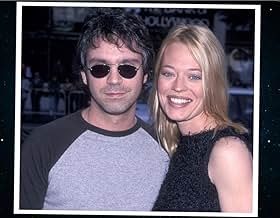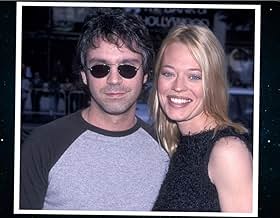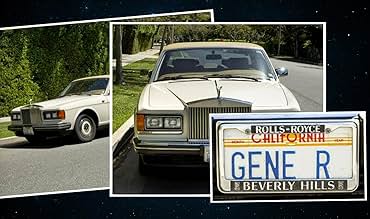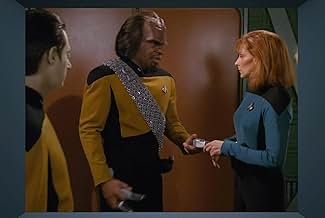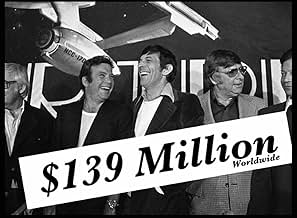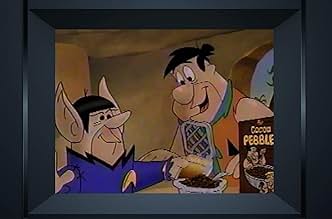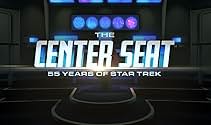Inside Star Trek: Hinter den Kulissen des Enterprise-Universums
Originaltitel: The Center Seat: 55 Years of Star Trek
IMDb-BEWERTUNG
8,4/10
690
IHRE BEWERTUNG
Chroniken mit seltenen und faszinierenden Details über die Anfänge von "Star Trek", die Entwicklung der Serie und wie sie in neue Bereiche vordringt, die noch keine Fernsehserie zuvor erreic... Alles lesenChroniken mit seltenen und faszinierenden Details über die Anfänge von "Star Trek", die Entwicklung der Serie und wie sie in neue Bereiche vordringt, die noch keine Fernsehserie zuvor erreicht hat.Chroniken mit seltenen und faszinierenden Details über die Anfänge von "Star Trek", die Entwicklung der Serie und wie sie in neue Bereiche vordringt, die noch keine Fernsehserie zuvor erreicht hat.
Folgen durchsuchen
Empfohlene Bewertungen
10XweAponX
I had to come to IMDb to determine the proper order of the episodes.
This is basically a longer version of William Shatner's great movie, "Chaos on the Bridge"
I was aware of the fact that Gene Roddenberry had been relegated to practically a fan of his own show after his failed interference with The Motion Picture and The Wrath of Khan.
And I never knew that Gene had a substance-abuse problem, it makes me relate to him a lot more, I know how terrible that can be.
This is a man who single-handedly created one of the largest television franchises ever, and then he was kicked out of it, and cheated out of his well earned royalty monies.
And he has a remarkable success story in how he clawed his way back not only his well deserved royalties but also to being in charge of Star Trek the Next Generation, through the machinations of Leonard Maislish, as told in the episode "Queue for Q". As despicable as the man appeared to be, he is responsible for one thing that we can all be thankful for: he brought John De Lancie in to play Q.
But what was good for Gene Roddenberry was not good for Star Trek the Next Generation, and we get to hear all about that in this series.
Gene personally wrote "The Cage", "The Menagerie", "The Omega Glory", some of the best episodes of the original series. And it even appears as if the original series when renewed for its third season at 10 o'clock Friday night, Lost a lot when Gene stepped down as Producer... so we can't really completely blame the horrible Friday night death slot, but also the fact that the show's main driving force was no longer involved in making the show.
But in this series, we learn about Gene's inability to write a movie script of any worth. Granted, he was a brilliant television producer and television writer. But he wrote script after script for proposed movies, and also the proposed "phase 2" television show which never happened, all miserable failures.
I could not understand how such a brilliant man could fail in this way.
But he made a big comeback for TNG, he was given back all, er, most of the authority that he lost. But he never really wrote any more episodes for television or elsewhere other than half of "Encounter at Farpoint", stepping on DC Fontana's toes in the process.
I was glad that they interviewed Diana Muldaur for this. I always thought that she had deliberately played Dr. Pulaski as if she were a female Doctor McCoy, and I always thought she was brilliant in that role. But I find it sad that she did not like working on the show, especially after adding so much to it.
Every television show has its dark spots, Trek has had its share.
It just goes to show that the cast and crew of this franchise are human beings, nothing more.
This is a brilliant and brutally honest series, expanding upon William Shatner's revelations from "Chaos on the Bridge".
But if you are watching this on Prime, come back to IMDb to find out the proper order of the episodes because they choked the duck, totally mixing up the order of the episodes so that the narrative makes no sense. I actually had to stop playback and come here to find out what was missing.
This is basically a longer version of William Shatner's great movie, "Chaos on the Bridge"
I was aware of the fact that Gene Roddenberry had been relegated to practically a fan of his own show after his failed interference with The Motion Picture and The Wrath of Khan.
And I never knew that Gene had a substance-abuse problem, it makes me relate to him a lot more, I know how terrible that can be.
This is a man who single-handedly created one of the largest television franchises ever, and then he was kicked out of it, and cheated out of his well earned royalty monies.
And he has a remarkable success story in how he clawed his way back not only his well deserved royalties but also to being in charge of Star Trek the Next Generation, through the machinations of Leonard Maislish, as told in the episode "Queue for Q". As despicable as the man appeared to be, he is responsible for one thing that we can all be thankful for: he brought John De Lancie in to play Q.
But what was good for Gene Roddenberry was not good for Star Trek the Next Generation, and we get to hear all about that in this series.
Gene personally wrote "The Cage", "The Menagerie", "The Omega Glory", some of the best episodes of the original series. And it even appears as if the original series when renewed for its third season at 10 o'clock Friday night, Lost a lot when Gene stepped down as Producer... so we can't really completely blame the horrible Friday night death slot, but also the fact that the show's main driving force was no longer involved in making the show.
But in this series, we learn about Gene's inability to write a movie script of any worth. Granted, he was a brilliant television producer and television writer. But he wrote script after script for proposed movies, and also the proposed "phase 2" television show which never happened, all miserable failures.
I could not understand how such a brilliant man could fail in this way.
But he made a big comeback for TNG, he was given back all, er, most of the authority that he lost. But he never really wrote any more episodes for television or elsewhere other than half of "Encounter at Farpoint", stepping on DC Fontana's toes in the process.
I was glad that they interviewed Diana Muldaur for this. I always thought that she had deliberately played Dr. Pulaski as if she were a female Doctor McCoy, and I always thought she was brilliant in that role. But I find it sad that she did not like working on the show, especially after adding so much to it.
Every television show has its dark spots, Trek has had its share.
It just goes to show that the cast and crew of this franchise are human beings, nothing more.
This is a brilliant and brutally honest series, expanding upon William Shatner's revelations from "Chaos on the Bridge".
But if you are watching this on Prime, come back to IMDb to find out the proper order of the episodes because they choked the duck, totally mixing up the order of the episodes so that the narrative makes no sense. I actually had to stop playback and come here to find out what was missing.
There's a great documentary about the history of Star Trek to be made but this ain't it. There are some good interviewees -- writers, producers, cast members, and others actually involved with the show -- but there's just as much or more useless stuff from people who just sound like superfans reciting history which should have instead been in the narration. If these people actually do have real expertise/in-depth knowledge, it's not made plain by their onscreen identifications. One is billed as "professor of sociology". So what? Does he teach a Trek class? Has he written a book? Why is he being interviewed instead of some other professor? If you want me to care what he has to say, how about telling me his actual credentials on the subject matter? Another is said to be a "writer and producer". Writer of what? Producer of what? Those who actually worked on Trek shows are identified as such, so who is this guy and why should I care about his opinions?
As for the actual narration, instead of an informative voice we get Gates McFadden doing her best to sound like she's saying interesting things--and regularly being forced to repeat herself because this is designed with ad breaks in mind--often in an inappropriately silly/jokey way. Her disembodied voice sometimes literally "interacts" with the interviewees, which I found to be a distractingly awful stylistic choice.
Worst of all is what's onscreen when it's not interviews or snippets from the shows/movies themselves. Every time D. C. Fontana is mentioned, they trot out the exact same picture -- a weird glamour shot from when she was very young. Roddenberry is represented by three, maybe four, repeatedly recycled photos. They endlessly reuse two photos of Robert Wise but only one of him actually on set of The Motion Picture. At some point, it becomes embarrassing how little effort the producers of this spent researching archival materials. And there's also absolutely moronic cutaway inserts of things like film being placed into a can, pointless stock footage and, in one particularly cringeworthy moment somebody's disembodied hands pounding on a table because an interviewee is telling a story which ends that way. Much of these--particularly the stock footgae--get repeated many times as well. These are the choices of people who have no business making documentaries and/or greedy Paramount executives who want to promote the cash-cow they've been milking for gazillions of dollars in the cheapest way possible, with no actual respect for the people who produced it for them.
As for the actual narration, instead of an informative voice we get Gates McFadden doing her best to sound like she's saying interesting things--and regularly being forced to repeat herself because this is designed with ad breaks in mind--often in an inappropriately silly/jokey way. Her disembodied voice sometimes literally "interacts" with the interviewees, which I found to be a distractingly awful stylistic choice.
Worst of all is what's onscreen when it's not interviews or snippets from the shows/movies themselves. Every time D. C. Fontana is mentioned, they trot out the exact same picture -- a weird glamour shot from when she was very young. Roddenberry is represented by three, maybe four, repeatedly recycled photos. They endlessly reuse two photos of Robert Wise but only one of him actually on set of The Motion Picture. At some point, it becomes embarrassing how little effort the producers of this spent researching archival materials. And there's also absolutely moronic cutaway inserts of things like film being placed into a can, pointless stock footage and, in one particularly cringeworthy moment somebody's disembodied hands pounding on a table because an interviewee is telling a story which ends that way. Much of these--particularly the stock footgae--get repeated many times as well. These are the choices of people who have no business making documentaries and/or greedy Paramount executives who want to promote the cash-cow they've been milking for gazillions of dollars in the cheapest way possible, with no actual respect for the people who produced it for them.
I was born in the late 60s, my dad liked Star Trek TOS when I was a youngster in the 70s and so mum was ok with me watching it too. I really enjoyed the animated series at the time but quickly forgot it as when I was 11 The Motion Picture turned up. Since then there have been a succession of films and series and there's been something new in terms of Star Trek for most of my life.
Having watched now the first 5 episodes it has been wonderful to revisit the beginning, the talented and creative people and real world things that happened. Disputes, tight deadlines and plan B, C or D situations that still somehow came together to create something that has always been really special in my life and that if so many others.
It's been so interesting to see archive footage of some of the team who aren't with us anymore and also learn so many things already (only half way through) that I didn't know before.
Having watched now the first 5 episodes it has been wonderful to revisit the beginning, the talented and creative people and real world things that happened. Disputes, tight deadlines and plan B, C or D situations that still somehow came together to create something that has always been really special in my life and that if so many others.
It's been so interesting to see archive footage of some of the team who aren't with us anymore and also learn so many things already (only half way through) that I didn't know before.
The Star Trek franchise does a celebratory 11-episode documentary series on itself. As with this type of shows, one has to be weary about personal slants of its creators. Of course, Gene is long gone and nobody has to tip-toe around his drug use. Nobody is deliberately trashing the man, ok except for one guy. They do walk that line of celebrating the show while not hiding its warts. This is very much for its fans. There is some fun information. Quite frankly, I remember the Desilu logo but I didn't know about Lucy fighting for the show. I do have a question or two which the show fails to answer. That's fair enough. This has good info and has some fun.
It's obvious that the interviewees spoke at some length, but the editors appear to think that the audience has no attention span. So their responses and recollections are clipped to show clips from the various shows. Much is left on the virtual cutting room floor.
Gates McFadden is a great narrator, though.
Star Trek deserves a Ken Burns style documentary, not this.
Gates McFadden is a great narrator, though.
Star Trek deserves a Ken Burns style documentary, not this.
Wusstest du schon
- WissenswertesDuring the history of Star Trek V, there was no mention about Lawrence Luckinbill (Sybok) for one reason. There was a mention of Lucille Ball who gave Star Trek TOS life on TV; Kirstie Alley (Saavik on Star Trek II) who met and played with Lucille Ball on a game show; and when it came to Lawrence Luckinbill, the only mention was Sean Connery was considered the role of Sybok. Not mentioned was Lawrence Luckinbill (married to Lucie Arnaz) was the son-in-law of Lucille Ball who gave Star Trek TOS life on TV.
Top-Auswahl
Melde dich zum Bewerten an und greife auf die Watchlist für personalisierte Empfehlungen zu.
Details
- Erscheinungsdatum
- Herkunftsland
- Sprache
- Auch bekannt als
- The Center Seat: 55 Years of Star Trek
- Produktionsfirma
- Weitere beteiligte Unternehmen bei IMDbPro anzeigen
- Laufzeit
- 46 Min.
- Farbe
Zu dieser Seite beitragen
Bearbeitung vorschlagen oder fehlenden Inhalt hinzufügen



